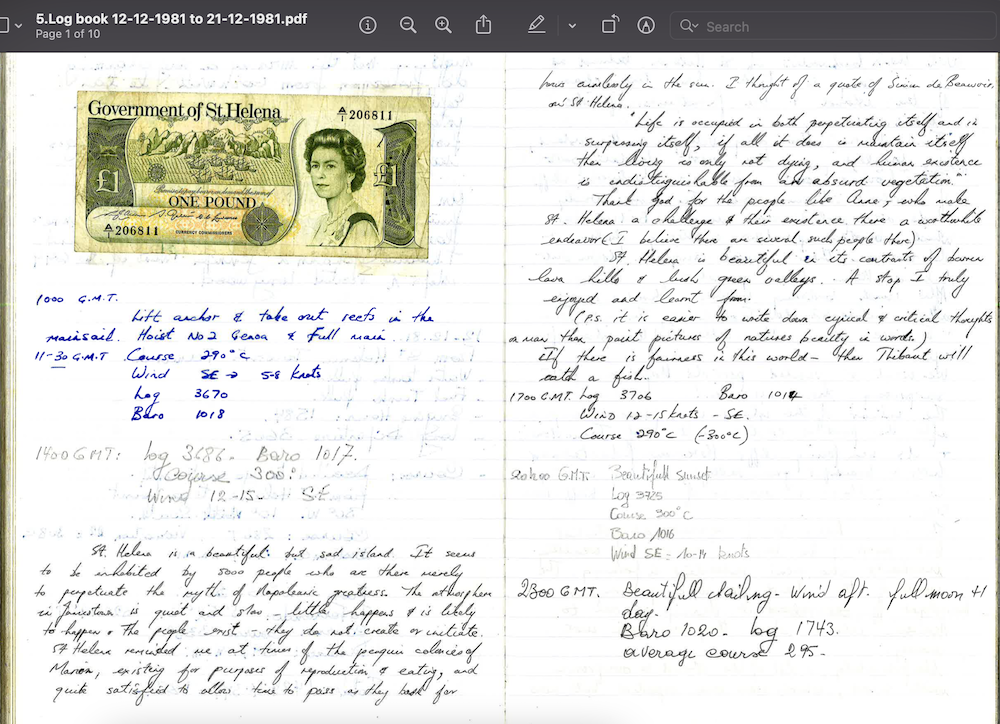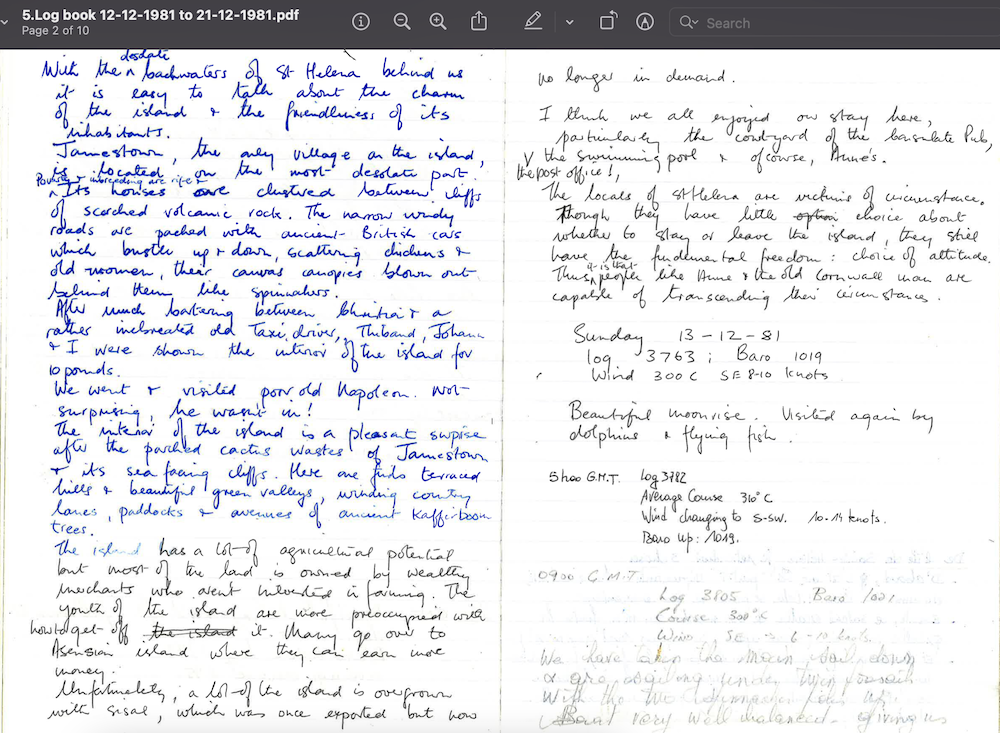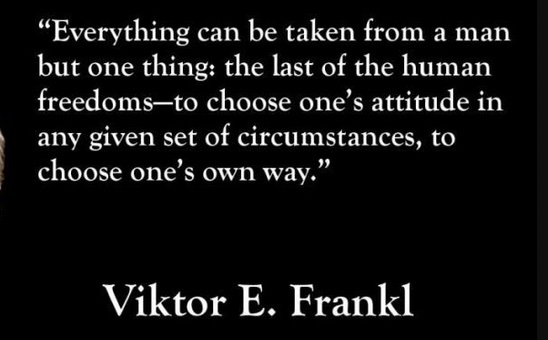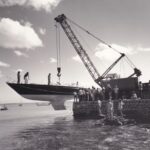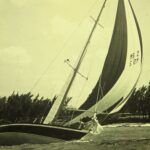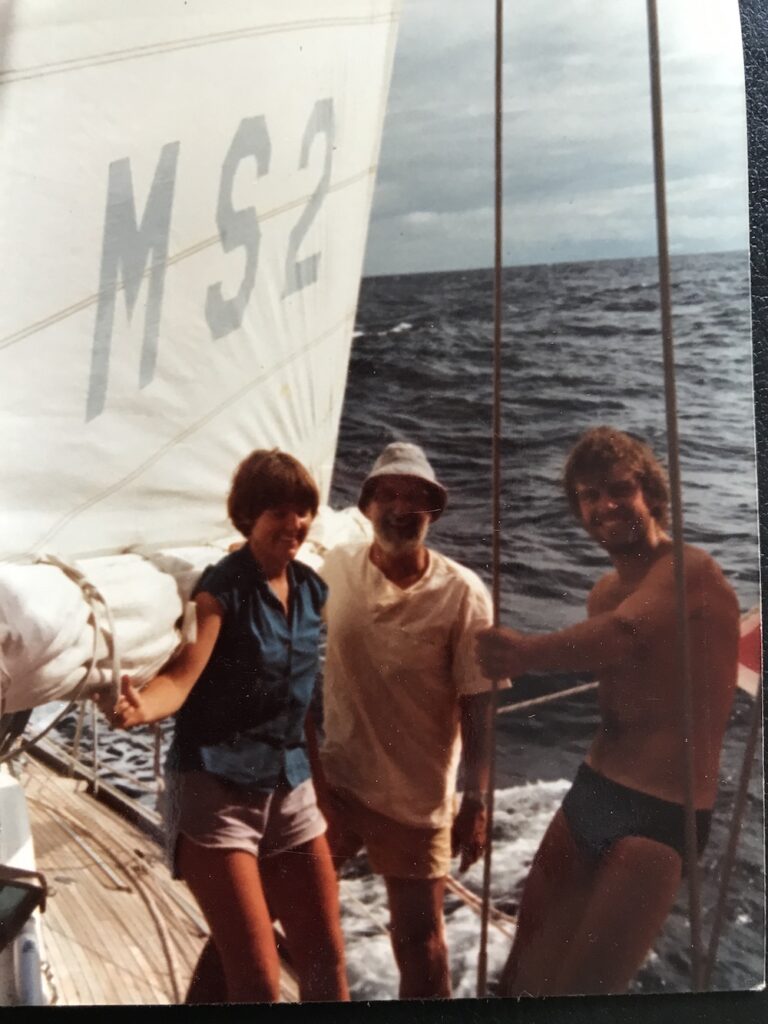
By Jennifer Griffiths
I first met Christian when I was in my mid twenties, two years after graduating from the University of Cape Town. It was November 1981. A friend of mine had joined a sailing boat on a cruise to the Caribbean the year before and had sparked my interest in yachts with her colourful stories of life at sea. I was working as a high school teacher at the time and had done no sailing as yet but lots of flying. My boyfriend, Neil, was a keen sailor. We were both young and looking for adventure and had told friends to keep an eye out for any boats looking for crew, preferably for a long distance crossing.
A few months before meeting Christian, Neil and I had driven up the South African coast, to Durban, to meet a young couple who had just bought a yacht and were planning a trip around the world. They were looking for another young couple to join them. Their small wooden boat didn’t look at all sea worthy, even to our inexperienced eyes. It was called “Rosewood”, and the new owners were wearing lenses even more rose-tinted than our own. They were completely new to sailing, busy learning the ropes and still grappling with the differences between latitude and longitude. Neil and I were both geographers. We had met at university in a post graduate geography class specialising in meteorology. Neil had just spent a year working on Marion Island as a meteorologist and I had recently earned a private pilot’s license so could navigate and do chart work, though not yet using a sextant. This was long before GPS, when navigational skills were a basic requirement to get from one port to another, let alone to venture beyond the horizon and out to sea. Being shipwrecked, or lost at sea along the world’s most dangerous coastline, was not what either of us had in mind for adventure.
We drove back to Cape Town in a more sober mood and went back to work. A few months later a friend who was running a yacht chartering company phoned to say that there was a message up on the Royal Cape Yacht Club’s notice board that might be of interest to us. A Belgian yacht was looking for 2 crew members to sail across the Atlantic to the Caribbean. By this time, Neil had already joined a racing team and had secured a position on a yacht taking part in the Cape to Uruguay race in a few month’s time, but he had a friend called Johan, who had been with him on Marion island, who was looking for an adventure. The three of us hurried over to the yacht club to look over the yacht and meet the skipper. I loved Blue Shadow the moment I set eyes on her. She was built for racing, not cruising, so she was sleek and low in the water, with hardly any topsides. She had a teak deck and her dark blue hull danced on its mooring inside the harbour wall. Fenders keeping her from bashing her dance partner, a dark wall of barnacles, and her rigging clicking at the gulls circling high in the blue above. We knocked on her side asking if anyone was home and were immediately invited aboard by two friendly faces, an old man and a young boy.
My first impression of Christian was that he looked rather stern and serious in his stiff skipper’s cap and large bifocals. He had a strong French accent and peered at us through his nose, inspecting us closly and wanting to know everything he could about us. (I discovered later that after our visit he had even phoned up both my and Johan’s alma mater universities to verify that we were who we said we were, and, fortunately, both of us had been given a clean bill regarding good conduct.) Fortunately Christian had his young nephew with him, Thibaud, who was a beautiful boy, in his late teens. Even though Thibaud was not fluent English he looked like an angel and smiled warmly at us and was open and friendly. This made up for his uncle’s more stern manner.
Christian was indeed looking for two crew members and wanted to set sail as soon as possible to catch the trade winds at their best all the way across the Atlantic. I said that I probably wouldn’t be able to leave for a few weeks, until early December, as I was committed to teaching until the end of the term. He told us to come back in a few days as he still had a few more people to interview.
A week later things started to firm up. Johan’s position seemed secure but mine was uncertain as there was another, older woman who wished to join the crew. She was an experienced sailor, whereas I had never sailed before. Fortunately, due to my pilot’s licence and navigational skills, Christian felt that my lack of sailing experience didn’t really matter. Like many skippers, he believed that temperament was more important than know how. He could easily teach any crew member whatever they needed to learn. If I didn’t get seasick flying then I would probably be fine at sea. This turned out to be true.
The fact that, in the end, Christian chose me over the other woman as the single female crew member says a lot about Christian and his intentions. Clearly he was looking for camaraderie and interesting conversation at sea rather than a physical relationship. I had made it clear that if I went it would be on the same terms as his male crew. Christian had a wife at home and he also had his nephew with him. It was obvious that what motivated Christian was his generous spirit, the deep desire to give young people an opportunity of a lifetime and the sheer pleasure of watching this adventure unfold. He loved to pass on his knowledge about life and to teach what he knew about sailing and navigation. He was interested in the stars and finding constellations or taking sun sightings with his sextant. He was also interested in the humanities, geography and history and told me once that my biggest weakness was I lacked a sense of history. (Although I had degrees in psychology, social anthropology and geography, I had turned my back on history and was fond of quoting Georg Hegel: “We learn from history that we do not learn from history.” Christian was determined to set the record straight and educate me in this regard.) Fortunately Christian was a good cook and wasn’t looking for a female crew to fill that position or I wouldn’t have made it through the first round. 😉
When we asked why not just take an additional crew member we discovered that Christian had some interesting ideas about crew composition. He believed that there should always be one woman on board, but never more than one. When we asked why, he said that women were territorial creatures and men not! He was adamant that having more than one woman onboard was a sure recipe for disaster. However, the presence of one woman onboard had a positive influence on the male crew. He believed her presence raised the living standards, cleanliness and morale of the male crew.
The only requirements Christian made was that each of us have an air ticket home from the USA. We should be agreeable and be willing to share the daily chores, plus the night watches and navigational work and be ready to learn the ropes in general. While we were on board we were his guests.
As soon as the decision was made things slid into place fairly rapidly. The principal of my school agreed to let me off early as it was near year end and the children were already writing their year- end exams. I phoned my parents in Johannesburg and told them I was about to jump on a yacht to sail across the Atlantic. They flew down to meet Christian to make sure I wasn’t heading off to sea with rogue. After deciding that he was a good man they agreed that I could go and stayed to see us off.
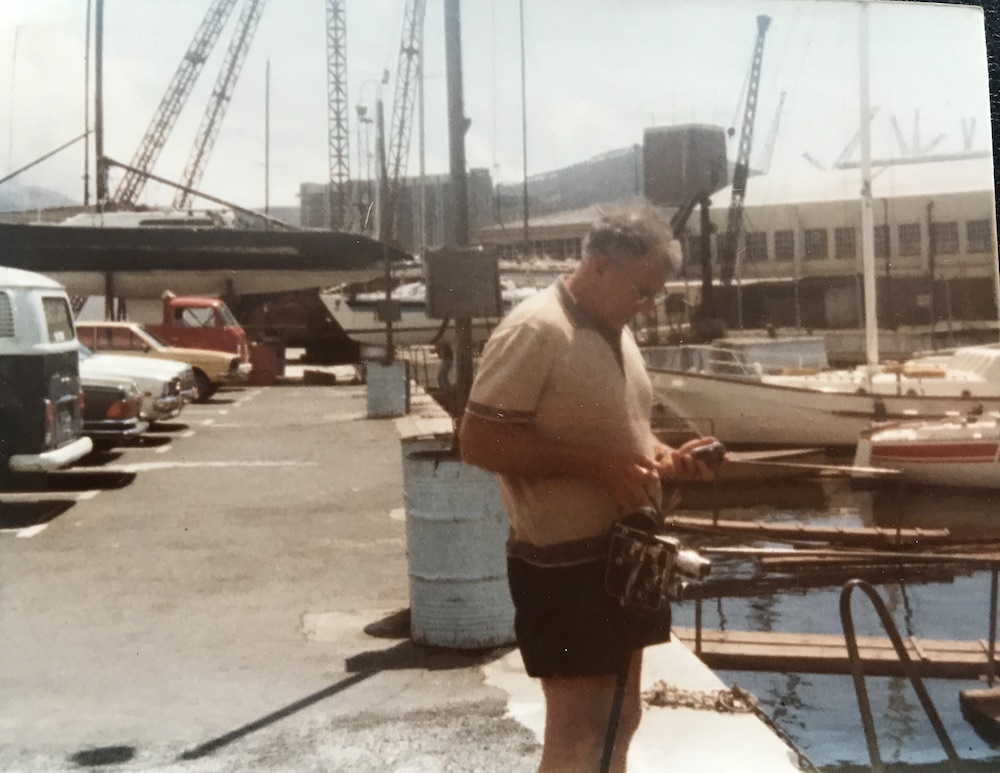
Dad loved to film everything and he took a 16mm film of Blue Shadow being hoisted back into the water at RCYC and of our departure into the blue yonder. Other friends came to see us off too; it was a grand farewell. Everyone thought we were headed straight across the ocean non stop, but actually Christian had a plan B up his sleeve, in case one of us was terribly seasick or wanted to bail out after the first day.
We set course, not directly to St Helena, two weeks away, in the middle of the Atlantic, but instead, about 30 miles due North, to Dassen Island, a small nature reserve for sea birds, just off the coast of SA en route to Saldanha Bay. We didn’t have permission to go ashore but the idea was to take shelter in the lee of the island for our first night. Fortunately the wardens of Dassen did allow us ashore to see the breeding colonies of penguins and gannets because Johann had spent a year on Marion Island, a similar but much larger nature reserve for breeding colonies, and had vouched for making sure we would behave ourselves.
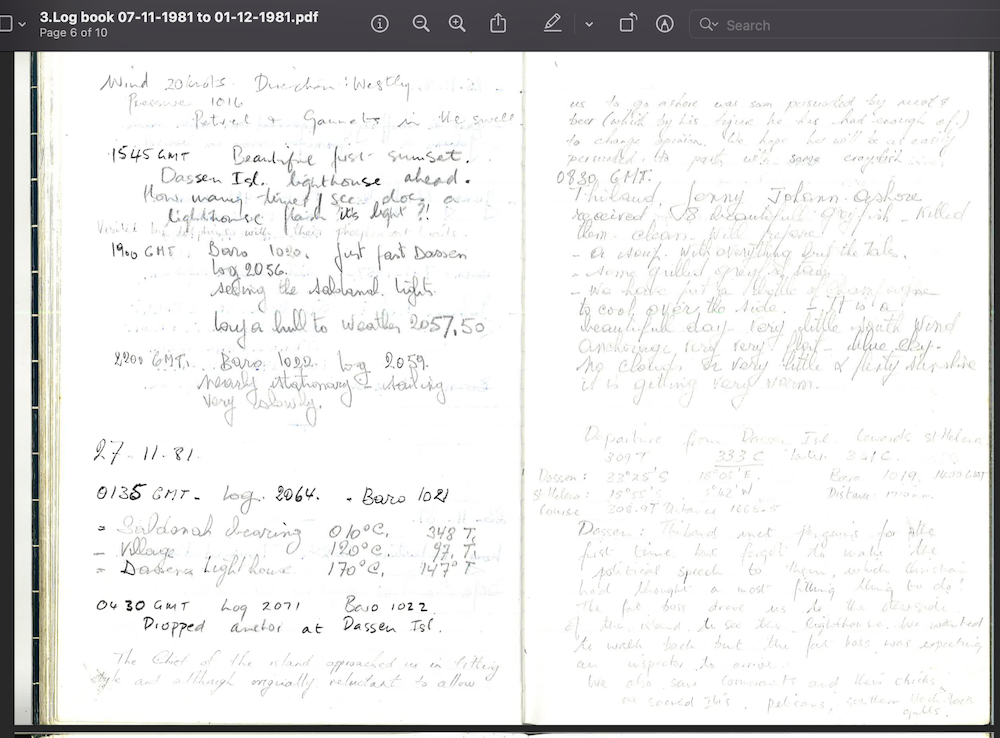
When we arrived at Dassen there were number of crayfish boats in the bay. Christian traded a bottle of whiskey for a crate of live lobsters. I was glad he was the one responsible for boiling them alive and not me. I had told one white lie to secure my position onboard. This was about food preferences. Christian had said he didn’t want anyone onboard who was a fussy eater or had special dietary needs. Up to that point I had been a fairly strict vegetarian. But I had told Christian I would eat whatever was put in front of me. That first night onboard was my first real test. When we came back from visiting the island, there was a mountain of boiled crayfish on the saloon table and I wondered how I was going to survive. Johann winked at me as he alone knew of my dilemma. He had secretly agreed to eat whatever I didn’t want but this time it wasn’t going to be possible. Normally meals were eaten in the cockpit but as we were at anchor we sat below in the saloon. There was no way I’d be able to pass my share to him or chuck any of it overboard. I resigned myself to my plight. The crayfish tasted like sea water and treachery. I wondered to myself, had I sold my soul for an adventure?
That first test was followed by another in quick succession. The next day we left Dassen island and pointed Blue Shadow directly away from the huge African continent, away from terra ferma, and instead towards a tiny insignificant speck of an island in the middle of the Atlantic. As it was to be our first real night at sea, Christian decided to give us a treat. To celebrate our initiation, he opened a tin of baby sheep’s tongues imported from France. What transpired was bit like a blue water version of Babette’s Feast. This cherished delicacy was totally lost on his motley crew. Johann was already a pale shade of green from simply being at sea, so I couldn’t secretly feed my portion to him. I swallowed the first one whole. They weren’t actually that bad if you didn’t look at them or think what they were. The most difficult part was having to chew on my own hypocrisy.
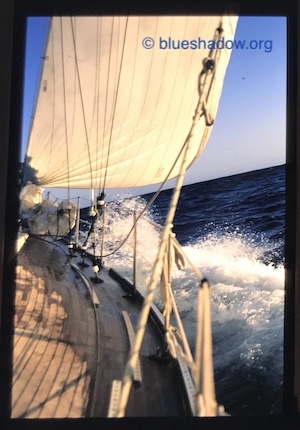
The sea gods were kind to us those first two weeks. We had a steady south easter, constant winds that hardly changed day and night. This gave us a chance to find our sea legs and to fall into a routine. It became clear why Christian had wanted a crew of 4. From prior experience, he had figured out the perfect roster. He divided the 24 hr day into four 6 hr periods, ending at sunrise or sunset, midday or midnight. There would always be 2 people on duty keeping watch, holding course and attending to the boat, managing the sails and steering gear. The other two could rest. This meant that each of us got at least 6 hours straight sleep and a further 3 hours on standby for the crew member on watch. It was a perfect roster as everyone got to enjoy both sunrise and sunset as that’s when we changed watch and had breakfast and dinner together.
You might think a 3 hour night watch a torture to endure but actually this was my favourite time at sea. Sometimes there were more stars in the sea than in the sky and our boat trailed a thick lively tail of phosphorescence swinging and slithering behind us as if we were a dragon or T.Rex making our way though the waves. Sometimes dolphins would visit us in the dark. They looked like ghosts in the phosphorescence with comet-like tails dancing and dipping under the hull, coming up for air alongside us. You could hear them breathe and then dive again and then sometimes they would return in the daylight and give us a show, riding our bow wave and occasionally leaping into the air.
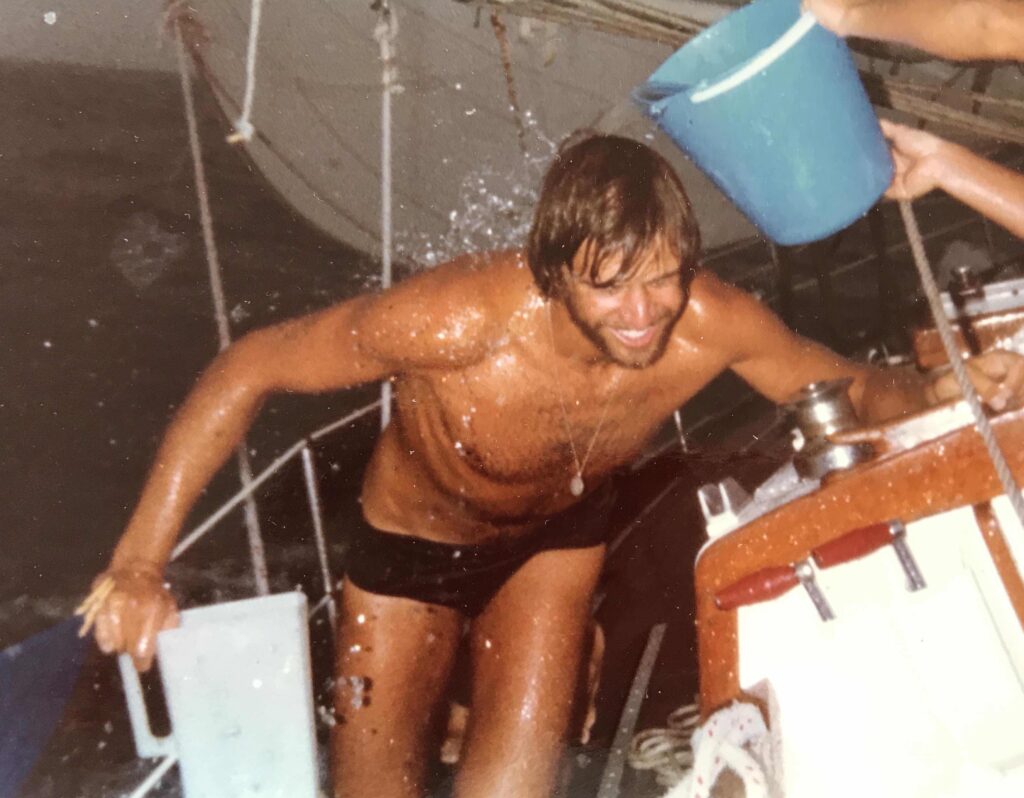
John gets a mid ocean Blue Shadow shower.
With Christian in charge of the cooking, the rule was to rotate the rest of the daily chores among the 3 crew: one person to wash the dishes, one person to dry the dishes and the other to help Christian with the navigation. I was very happy when the boys defected after a few days saying they would rather do the washing than the navigation. I loved taking sun sights, learning how to plot our course using the nautical almanac . Also, Christian had some really good books on board to explain the theory behind what he was teaching me in practice. For me, navigation by sextant was a miracle. After two weeks of taking sun sights and calculating where we should be I wasn’t totally convinced that we would actually find St Helena. After all, it was a rather tiny island, in a rather large ocean. A bit like looking for a pin in a haystack. Our calculations were based on dead reckoning. A sun sight can only give you an angle from the sun, in other words, an entire circle of possible locations for any given moment in time. Assuming that your clock time is accurate, where your course of dead reckoning (your direction plus estimated distance travelled) intersects with the circle is were you are (apparently, or should I say, hopefully.)
The day we were due to arrive in St Helena we marked our location and the island’s location on graph paper. We calculated how big it should look and at what compass direction and drew its size. There were clouds on the horizon. It was sunrise. We all scoured the line where the grey of the sea met the grey of the sky and then suddenly the clouds lifted and there it was, exactly where it was supposed to be. A tall chunk of land loomed ahead. I was amazed and impressed and delighted. After two weeks of calculating I had thought our chances pretty slim, and there it was ahead of us, exactly where we expected to be. It was a miracle. (I think sailing with GPS has robbed modern day sailors of the sheer delight of this experience.)
Before sailing into Cape Town, Christian had sailed from Mauritius south around Madagascar to Durban with his nephew Thibaud and 2 crew from Mauritius. They had experienced really bad weather and huge seas and the Mauritian crew, who had wanted to bail in Durban, had decided (to our good fortune) that they were not going to sail beyond Cape Town.
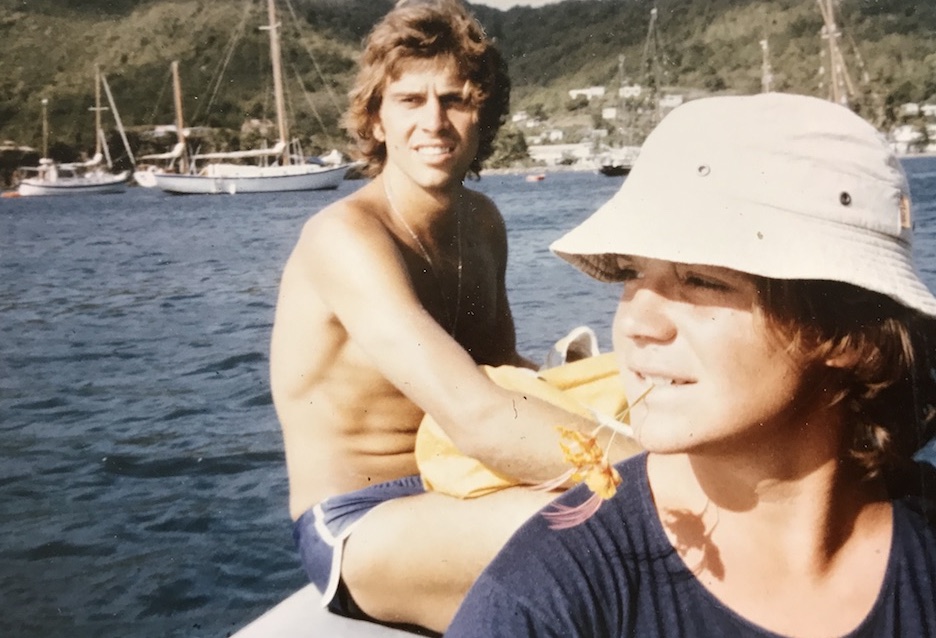
Christian said that south of Madagascar after the storm was over and the winds died the swell was still enormous. Each wave was so huge it was like throwing Blue Shadow off a building and onto solid concrete. In comparison the Atlantic was a breeze. We had spent exactly 2 weeks at sea and had hardly changed our sails. Now it was time to go and explore the island where Napoleon had spent his last years.
Thibaud and Johan happy to be approaching land after weeks at sea.
After a week in St Helena we weighed anchor and wrote our impressions in the ship’s logbook. Johan’s impressions are recorded in the first extract and mine in the second.
